S2:E11 Coffee Conversations - Roofing Day 2021 - PODCAST TRANSCRIPTION
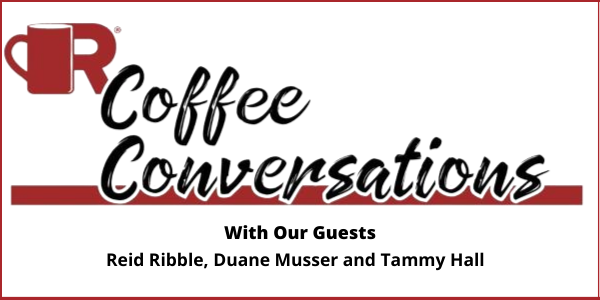
Editor's note: The following is the transcript of an live interview with Reid Ribble, Duane Musser and Tammy Hall of the NRCA RoofPac team. You can read the interview below or listen to the podcast here.
Heidi Ellsworth:
Good morning and welcome to coffee conversations. My name is Heidi Ellsworth, and I'm a partner with Roofers Coffee Shop, and we are so happy to have you here today. I personally am so happy to have all of you able to engage and visit with these wonderful folks we have onscreen today. We are talking about roofing day, one of my favorite days of the year, and this year is going to be really, really special. So I want to introduce our guests who are here today to talk about roofing day 2021. Reid Ribble, the CEO of NRCA, Duane Musser, the vice president of government relations, and also in charge of ROOFPAC. And I probably said that wrong so we're going to let him say that again. And Tammy Hall with CFS Roofing, and we will also let her introduce a little bit about what she does with this awesome roofing company down in Florida. So all of you welcome to the show.
Reid Ribble:
Great to be with you, Heidi.
Duane Musser:
Great to be here.
Heidi Ellsworth:
It is so great to have you all here. So let's get started. Let's get going with some introductions, and then we get to the really fun part when we start talking about roofing day. So first off, Duane, can you tell us just a little bit about yourself and about ROOFPAC and all the things you do with NRCA?
Duane Musser:
Sure. Absolutely. Thanks for the opportunity and good morning to everyone out there. Yeah, I'm Duane Musser, vice president government relations at the National Roofing Contractors Association. I've been with NRCA for about 13 years now. So I basically oversee all of NRCA's political operations in our Washington DC office. And I've been in working in Washington DC about 30 years now. I caught the political bug while I was in college. Fortunately or unfortunately who knows, but I've been worked as a congressional staffer for a member of the house of representatives for a number of years, which is kind of how I got my start in DC and then worked in government relations consulting ever since.
And basically, I represent on behalf of NRCA the roofing industry on all the issues that are important to roofing contractors, manufacturers, distributors and everyone in our industry. Whether it's tax issues, workforce related, OSHA related regulations and whatnot, we follow and work on everything that is important to the roofing industry. And of course, roofing day in DC which we're going to talk about here is our major annual advocacy event. We're going to talk more about that and that is a really, really exciting initiative. And then also, I think we're going to talk a little bit about ROOFPAC, our political action committee which I also oversee in the Washington DC office with my colleagues.
Heidi Ellsworth:
Awesome. Duane, thank you. Thank you for being here today and thank you for all you do. I watch and see you. You are constantly standing up for all of us every single day in Washington DC. So thank you so much.
Duane Musser:
Thank you.
Heidi Ellsworth:
That's it. And so I would also like Reid, I know we probably don't need any introduction, but could you tell everybody a little bit about yourself and just kind of what's happening, just real quick about NRCA too and everything that's going on.
Reid Ribble:
Well, it's hard to do that really quickly. My bio I can do really quickly. I spent 30 years as a roofing contractor, decided to run for Congress. I ran for Congress in 2009, served six years in the US house of representatives. And then NRCA, their long-time CEO, Bill Goode was retiring and they reached out to me to see if I would consider coming and being their new CEO and I was delighted to do that. And so now I'm in that position here at the national association. And then there's just a lot going on as you're aware of Heidi. We launched a brand new healthcare program. So if you're having struggles finding health insurance in your company, we can now help you with that.
Our team in DC has been doing yeoman's work over the last year. This entire COVID experiences has dialed everything up. And you talk about how hard Duane works. There were a number of times that Duane and I were talking 10:00, 11:00, 12:00 at night on weekends as he was working with members of Congress as they were working through the night. When they're in session, we're in session. And this team worked extraordinarily long hours all three of them. And so we're just involved in virtually every single thing that you can imagine. If it has anything to do with the US roofing industry, we're there.
Heidi Ellsworth:
Wow. Wow. Reid, thank you. As always again, I said to Duane but I'm going to say it to you, this is really since you've been coming to the CEO and everything you did before that with NRCA, but it's just all about the professionalism and it just continues to grow and grow and grow. So thank you for all your leadership. It's pretty awesome.
Reid Ribble:
You're welcome.
Heidi Ellsworth:
Okay, now I'm really excited. Tammy, I have to just say before you introduce yourself, Tammy and I have spent many hours during NRCA meetings sitting on possibly with a beverage in front of us talking about politics and I've learned so much from Tammy. So Tammy, please introduce yourself and thank you for being here today.
Tammy Hall:
Well, Heidi, I'm honored to be on a panel with two very distinguished gentlemen. So thank you for inviting me. I do work for a large full service roofing contractor in Southwest Florida, CFS roofing, and my responsibility deals on the corporate level, but I'm also in charge of overseeing our service division and our sales and marketing. So my plate is always very full. But it's my honor this year to be a new board member on NRCA. It's unfortunate with COVID so I've missed all the fun of seeing everybody in person. I started out with NRCA serving on the ROOFPAC committee and on the roofing day committee. So that's how I kind of got my start there. Also in Florida, I serve on the Florida Roofing and Sheet Metal Contractors Association board, and I serve on their, I chair their government affairs and our PAC there. And then we have a local affiliate that deals with selfless Florida roofing. And I volunteer as an administrator there and try to keep those guys going on the straight and narrow and I also represent them on the affiliate council for the Florida Roofing Association.
So I stay pretty busy, but I've been in roofing for seven years. And I've got to tell you, once you start, it's hard to get out of this industry. There are an incredible amount of people that from all walks of life, but they're doing a great ... It's a wonderful industry and I've learned so much. And I want to really say that NRCA provides such a network of people that will share much larger companies than ours, much smaller companies than ours, but the perspective and the challenges are really all the same. So they have been great mentors to me to continue my career in this industry and I'm so appreciative. And again, very honored to be a newbie on your panel today.
Heidi Ellsworth:
Well, we are very honored and Tammy is also one of our new 2021 influencers on Roofers Coffee Shop. So we are very excited to hear more from her throughout the whole year. So Tammy, thank you so much. I have to tell you, we're going to get into this, but I'm so excited because you have really, Tammy has really walked the walk. I mean, being involved on the local level, on the state level, and now I was there at the NRCA meetings when she started coming into ROOFPAC and government relations and stuff. And it's just going to be such a great addition to be able to see all those parts and we're going to talk about that today. So before we get started on our questions, which we do have some questions that came in ahead of time, but I want to ask all of you who are out there to be sure to ask questions.
This is an engagement opportunity. So how often do you get to ask questions? Reid and Duane and Tammy, you can either just type them in the question box. You can come on audio, especially if you're on the West coast. You may not want to be on video. And or you can come on video and ask your questions or share your experiences about roofing day in the past. So all you have to do is raise your hand. Megan Ellsworth is back there, she'll chat and get you all set up to come onto the show. So thank you so much and we'll get started. First thing, first question, so that everybody gets the big picture is Reid, would you share how did roofing day start and really kind of give a little bit of its history.
Reid Ribble:
Yeah, sure. So when I was in Congress serving as a Congressman from Wisconsin, various groups would come in to see me all the time. And the electricians would show up and the plumbers would show up and the bankers would show up. And at the time, a handful of roofers would show up, but the way NRCA was doing kind of a fly in sort of thing is every other year, they would hold their fall committee meetings in Washington DC. And they would invite people to come up to Capitol Hill and talk to members of Congress and Duane would know more about how many people would come. But it wasn't anywhere near the number that was necessary to have the impact that we wanted to have. And so when I left Congress, I was able to bring with me the experience of being a member of Congress and seeing trade associations and industry groups and how they did it, the variability in how they did it.
But most importantly, Heidi, I was able to see and observe the ones that were most effective. And one of the things that I learned in my six years in the house of representatives was that the industries that were most effective at this were are the ones that could bring in a fly in across the entire supply chain. Because here's what would happen too often, an industry would come in with only part of the supply chain. So let's take the electricity. The electricians would come in, but we would just have the electrical contractors in the room and they would be asking for this or that. But then a week or two later, the electric manufacturers would come in, but they would be asking for something totally different than what the contractors were asking for. And in essence, what they were putting onto me as a member of Congress was the need to make a decision for one group but that ultimately resulted in against another group.
And what no member of Congress wants to do is tell any group no. That means you're turning a voter off. And so the groups that were most effective were the groups that would bring in the entire supply chain in a single fly-in, where the entire supply chain, raw material, manufacturing, distribution, design and construction all agreed on what they wanted, because now there was no no, because I didn't have to say yes to manufacturing, but no to construction or yes to construction, no to manufacturing. They came in with a unified voice. Two things happened then when I came back to NRCA. When I say it came back, one of the things I didn't say is prior to going to Congress, I was a longtime member of NRCA, served four terms on their board of directors and was a past chairman of the board.
And so I knew the association really well. And so when I came back to NRCA, I decided that we were going to do a fly-in, but we're going to do a different, but to do it different meant that NRCA as an organization had to change. So the first thing I did was I started NRCA's one voice initiative. And the one voice initiative was to begin to pull these disparate groups together and say, "We've got more in common than we have disagreement. Let's focus on what we have in common, because if we can unify the industry, we can accomplish really big things." And then I decided to do the fly-in. And it's typical and I think Duane will, maybe he's still a little sore, but maybe he's gotten over it. I just said, "We're going to do this." And I dunked it on him and said, "You guys figure out how to do it. Here's how we're going to do it."
But I remember the very first roofing day that we had in 2018, I walked into that room in, I think it was April of 2018 into our opening reception. And I almost choked up because I walked into a room with 400 people, not 35 or 50, but 400 people from across the entire United States and across the entire supply chain and we had all agreed on what we were going to talk about. And we had effectively taken the no away. And from day one, roofing day has put wins on the board for the roofing industry every single year, which I knew could happen if we did it correctly. And so and we plan on putting wins on the board going forward. Again, this year we're going to continue to do that.
And the key thing here, and I want to drive this home to everybody listening, you do not have to be a member of NRCA to participate in roofing day. This is an industry-wide effort. It is supported industry-wide with sponsor from state association with like a good friends down in Florida, as well as regional associations and national industry partners like ARMA, PIMA, SPRY. I mean, virtually the entire industry comes to this event and you need to be there and that's how it got started.
Heidi Ellsworth:
Well, I was in that room in 2018 when you walked in Reid and I have to tell you, I think I did cry because it was, we had all of these politicians there of the people. And I know I've said it many times, I don't think I ever have had a huge sense of pride in the roofing industry as I did on that day and every year. That's why roofing days is one of my favorite times, because it's so important politically and for regulations and everything else, but it also is so important for the heart of our industry and for how everyone comes together to show the professionalism.
In fact, before we get onto what's going to happen this year, one of the funniest things that I've ever seen is Duane and Alison and the group there had built these beautiful folders, beautiful folders with all these sheets in them trying to educate us all on what to say when we walked in and how to work through that. And forgive me, I'm going to say the name of the building's wrong, but we were in one of the buildings in the Senate and there were multiple layers and multiple stories. And somebody on the very, very top dropped this folder and it came down over all the people down below roofing, roofing, roofing, everywhere. And so I thought, well, they won't forget us.
Reid Ribble:
Yeah. I'll give you a little background on the folder idea. We needed to have a ... First of all, we wanted to everyone to have the same color folder and we wanted the messaging to be the same. And there was a little bit of a disconnect between what the team in DC wanted to do and what my marketing department wanted to do. And my marketing department decided they wanted to do something different than what the team in Washington DC wanted to do. But the marketing department really didn't know how Congress works and why we were doing things in a specific way. And so they had printed up a whole bunch of folders wrong. And in the last couple of days, they had to redo all of them over because there's a very specific process that a congressional office goes through and I knew what that process was.
Duane knew what that process was. Terry Dorn knew what that process was because we had all been part of that process. But our team in Chicago, Rosemont was not all that familiar. And they thought in terms of marketing, we thought in terms of communication. And so everything had to be redone at the last minute, but they they got it done and it was a stressful moment and Duane remembers those days, but we're well past that now. And I'm hoping at some point, I don't know whether you even have it here, Heidi, but if you do, at some point, I hope we have a slide with the sponsors on it, because I want to talk about that at the end, because it's really critical for people to understand why those sponsors matter. And it's not the money, it's something totally separate from that.
Heidi Ellsworth:
Well, that's good because we do. We will show that at the end. We're going to show the webpage and the webpage has all those sponsors on it.
Reid Ribble:
Yeah. And I want to talk about that a little bit if you can come back to me at that point.
Heidi Ellsworth:
Yes. Perfect. So we've come a long way and that's really good. So going from folders floating in the Senate building and being reprinted to 2021 where everything's digital and we're going into a whole new way of communications. So Duane, can you share with everybody out there how this is going to work, really what's roofing day 2021 going to look like?
Duane Musser:
Sure, sure, absolutely. It's going to look a little bit different because it's due to the ongoing COVID pandemic, we were not able to ... We had had roofing day in DC 2021 scheduled for March 23rd and 24th. That's been long scheduled. Of course we had been hoping to do an in-person event as long as we possibly could and we had the hotel set up and everything, but then of course we had to shift to virtual. So it will be a virtual event and it will be similar, but a little bit different. Basically we have, normally during the in-person event, you would come in on the Tuesday afternoon, which would be the 23rd. We had a two-hour program with Reid a keynote speaker and issue briefing and some advocacy training and then we go up on Capitol Hill that following day on Wednesday, the 24th in person .
This year, it will be similar. We are breaking the two hour kickoff event will be kind of broken up into two things this year because of the need for some technical training for the online virtual capability. So we're going to have two events. The first one will be a webinar on March 17th, one week out from roofing day and that'll be basically the advocacy training and making sure everybody's comfortable with the online format. We've hired a consultant who specializes in running programs of this nature. They are one of the biggest firms or I guess the biggest firm in DC that's been running in-person events. And of course, last year when COVID hit, they switched to doing the virtual events.
So they've been doing this now for a better part of, not quite a year, I guess nine months roughly. So they've done 30 or 40 of these types of virtual advocacy events, virtual fly-ins already and they will have an online platform that all of our participants will use for their virtual meetings. So we'll have the webinar with the technical training and the advocacy training give you a little bit of a background on how to run your virtual congressional meetings. That'll be on the afternoon of March 17th, one week out. And then on March 23rd, the day before roofing day, we will have a pro short zoom program or webinar with Reid will be speaking. We're pleased to announce we're going to have keynote speaker, Senator Ben Sasse from Nebraska is going to be joining us for a keynote.
We just learned that in the last few days. He is really a leading senator. We work with him on a number of our issues. He's been really interested in workforce issues in particular, and he's going to be our keynote speaker that afternoon of the 23rd, March 23rd in the afternoon. And then we'll also have a little bit of an issue briefing, and we're going to have breakout sessions for people in their states. So we have a lot of participants. So for example, Tammy in Florida, I know the Floridians have brought the biggest delegation in recent years. I think you had 45, 50 people the last couple of years.
And so we need them to coordinate their meetings for the next day. So we're going to have breakout sessions. So that'll be on the afternoon of the 23rd. And then March 24th will be roofing day in DC, virtually, and you'll have, participants will have three or four virtual meetings online like this. Some of them may be phone calls, just conference calls with the staff, if we can't get the member, but most of them will be virtual meetings just like this. So just like you would be in, if you were on Capitol Hill, but in a virtual setting as we come to know is now the norm during COVID.
And basically once you register for roofing day in DC, almost all of the work is done for you. Our consultant that we work with schedules your meetings for you, maybe about a week out, you're going to get your schedule. I think it might be maybe five days ahead of time you're going to get your schedule. You will get the talking points for the issues papers that we're working on. We'll talk about those issues in a minute. You'll get those probably a week to two weeks in advance so you can look at those and digest them and relate them to your business which is what we want to do, have people in their virtual meetings with members of Congress, explain how these issues, these policy issues impact the roofing businesses back in their home state and districts.
So your appointments will be set up for you, your virtual meetings will be set up. We'll provide everything. You just have to participate in the March 17th webinar, and that'll be recorded so you can do it at your leisure. The March 23rd event will be live, and then your meeting's on the 24th.
Heidi Ellsworth:
Wow. Wow. Is it an amazing in a year how all this has been able to change and accommodate? And so I think it's great that we're ... I'm sure there's a lot of people out there are like, "We just won't do it." But we're doing it and we're going to make this work and virtually, I think that's just incredible.
Duane Musser:
Yeah. Yeah. And I just want to emphasize, I mean, everybody knows people are tired of virtual. We're tired of not being able to do the social things that we could do pre-COVID. And it's only going to be so fast we can get back given what's going on. But this is a real opportunity because ... And of course, one of the things we've been emphasizing is, hey, hey contractors and other employers, bring some of your field employees. And of course that is not easy. If you're going to bring them back for a live event to Washington DC, that's a lot of expense. You've got the time away from work, the travel expenses, the airfare or other travel and hotel and food and all that kind of stuff. But now you can do it for very, very little of that cost. And so now is a real opportunity for us to grow roofing day even more and get more people involved in this format. And then we can also get them more involved in future in-person events, which obviously we're going to be going back to as soon as we possibly can and certainly hopefully in 2022.
Heidi Ellsworth:
Yeah. Yeah. Hopefully, and it probably is always going to be a little bit now going forward of a combination, a hybrid, but at least we'll get back in person as we're going.
Duane Musser:
Absolutely. I mean, there are all kinds. I mean, we all know COVID and what's going on is transforming so many things and so many things are going to be hybrid. And of course, even before COVID, you know, roofing day was designed to give people a chance to come to DC and meet with their folks on Capitol Hill because that's kind of neat in of itself for people, for citizens. They should do that for their own. But also to establish a relationship and not just come back to Washington DC once a year for roofing day, please do that. But also then establish that relationship and have those members of Congress come out to visit your business once a year or you even go visit them at their state or district office, the local office.
And so at a minimum you should really be trying to meet with your member of Congress twice a year, once at roofing day, and one other time. I mean, that's ideal. And then you can communicate with them by email or phone even in between those. You develop ... I mean, we all know, I mean, roofing and so many other things are relationship-based. Politics is the same way and that's how we really get things done in DC. So yeah. So moving forward, there's probably going to be some other things, hybrid forums regardless of what's in person. Yes.
Heidi Ellsworth:
Yeah, yeah. It's really interesting. And I think I want to take this question and we have a couple of questions coming in, but Tammy, I want to really, from your perspective, everything you've done on a local, state and national level, why is it so important that roofing contractors and roofing professionals overall, let's just go across because it's really across the board, but from your perspective, why is this so important?
Tammy Hall:
I think Reid has said it over and over again, we got to put a face on roofing and we have to elevate the perception of the roofing industry and who we are, not only as business owners, business employees, but as an industry as a whole. This industry is a driving force in our economics. We're part of the construction industry. And if you think it was by hap hands that we were an essential workforce, shame on you. The efforts that are made by the relationships we've been able to establish, of course, some prior to 2018, but the fact that 400 plus people safely and respectfully came to the Capitol to talk to our elected officials, whatever party they were from and then we went and talked about what's important on the ground to our industry, to our families and to an economic pulse that's happening right now.
And I think that our efforts in Congress, our efforts in workforce and education, all the things that we're doing and we're seeing these successes now is a result of those 400 people articulating who we are, what we stand for, but also you can't miss the fact that when you put a face with an issue, it's so much different, it's so much more powerful. I know people were disappointed that they didn't get to actually meet with some of their elected officials, but as Duane said, take that opportunity to meet with their staff, follow up with that staff and schedule an appointment when they're back home. You're going to get more time with them back home. It's going to be a much more relaxed environment. And again, you're going to put a face with an issue. You're going to put a contingency of what it means to your local economy.
We employ over 200 people in Southwest Florida. We have four offices. It's not a mistake that the owner of CFS said, "Hey, Tammy, I want you to be involved politically. I want people to know what we're doing here." He comes from a fourth generation of roofers, but he broke out on his own 10 years ago with nothing. And he said, "We're going to make a difference. We're going to let people know that roofing is a skill. It's not a ... everyone needs a roof. We're like the medical profession for goodness sakes." We got to protect your assets. We're protecting your most valuable thing in your life, your family. If you don't think that's important, oh wait till you have a leak, you call me [inaudible 00:28:52] who's out there to get on your roof and make sure that you stay dry, that you're protected from the elements, that your valuables that your great, great grandmother gave you are safe and sound.
All of these things are a reminder when we sit in front of these elected officials and we have these stories, they're like, "Oh, the light bulb goes off." It's not like they're getting an email. And when they see the face of roofing, wow, is it ever diverse. There's women, there's men. It's every color. It's all of that. And they begin to put two and two together because they're political animals. And you can see that so clearly right now in the state we're at. So again, how we layer these relationships, one of the things that we're driving home in Florida with our affiliates, which are we have 13 of them across the state of Florida, is to start doing little fundraisers. When you have a golf tournament, invite your local representatives, but also your state and your congressional to come golf, come and be a guest speaker, do some little fundraising.
We did a fundraiser for a state representative here. I collected about $4,000 in $25 and $100 checks. Do you know how many people's names he got to put on his contribution list? It was awesome. And he's one of our biggest supporters in the state legislature. Florida meets for two months, it's fast and furious. So again Reid, thank you so much for really bringing home to the industry that we absolutely have to put a professional face on. And we're not a bunch of people that came out of the Backwoods with a hammer and a nail. This is an industry, this is a business. This is a multi-billion dollar industry. And when you look at it from the manufacturer side, all the way through as they say through the chain, oh my gosh, we are a force to be reckoned with and we will come to the Capitol in a peaceful, respectful way to get our point across.
And so I can't speak enough to the incredible movement that we've had in NRCA would making sure that people understand we have to be engaged. If you're not engaged, then I don't want to hear you complain. But right now, these volunteers, these members that are volunteers and the staff, we're carrying the heavy water and we need more people to help us with that. It makes it much lighter if I've got 10 versus two. And again, especially with COVID, us becoming an essential industry where our job sites weren't shut down and our industry wasn't shut down did not happen by mistake. It happened because we were able to give Duane and his team in DC the support of seeing who we are and what it means to our local economies, our state economies and our national economies. So when we had roofing put in there, that was one purpose. So I got to say, get involved guys, make sure, take the time. It's not that expensive. Take the time.
Heidi Ellsworth:
I think that's one of the hardest parts too is people think, I just don't have time. Things are so busy, everything's happening, but we can see what has happened because of people taking the time and making it happen out there. And we actually have a question as you all saw, we had a quick glimpse of our next question, but let's get Megan, go ahead. Let's bring Bill on. Hello, Mr. Bill Collins. It's nice to have you on the show.
Bill Collins:
Hey, I just wanted to ask how do we make the arrangements to meet with our Congress person?
Heidi Ellsworth:
Bill, thank you so much. That's a great question. You know what, as people are going through that, let's just address that real quick. Duane again, how should people start getting so they hear this throughout show.
Duane Musser:
Absolutely. They just need to register on our website for the event. So it's www.nrca.net/roofingday. So go to nrca.net/roofingday, and you can register right there on the web. It only takes a few minutes. It's $59 per person and $25 for field workers. And if you were signed up for our roofing day in DC in 2020, which of course had to be canceled unfortunately last April due to the COVID, we did roll over everybody's registration unless folks specifically requested a refund at that time, which was not very many people. Those people have been rolled over automatically. So your registration transfers, you do not have to repay the registration fee. We do need you to confirm, and there have been emails that have gone out informing people who were rolled over, who were registered last year already, their registration was rolled over to this year.
We just needed to confirm that you're going to be present. And so if you get that email, you can just click on where that email is or you can contact the NRCA Washington DC office. And my email is D as in my first name, last name musser@nrca.net or Deb Maizel who works with me in the DC office is kind of our point person on roofing day stuff right now. And she can help as well as I can help get people registered, whether you're in that situation with rolling over from last year or new register.
Bill Collins:
Okay. So if I did that, I can assume that I'm all set up.
Duane Musser:
Exactly, absolutely.
Reid Ribble:
Our staff, then will set up that appointment for your Bill and it's all based on where you live, because we want to make sure that we get you in the right congressional office.
Bill Collins:
Yes. Thank you. And not just for me, it's for other people, but I want to make sure that there's some confirmation so that I'm at the right place at the right time.
Duane Musser:
Absolutely. Yeah. And if you have anybody has any questions with the process, you just get ahold of us in the DC office.
Heidi Ellsworth:
Bill, thank you. Great question. Thank you and it's good to see your face. I'm glad you're doing well. Thank you.
Bill Collins:
Thank you.
Reid Ribble:
Yeah, good to see you, Bill.
Bill Collins:
Thanks, Reid.
Heidi Ellsworth:
We have a couple other questions that are coming up here too. So we're going to be seeing some folks come in, but one of the things I wanted to tie into right now that I think is really important is bringing employees to roofing day. So really talking about bringing on your field staff, your office staff, whoever can be a part of this to really show the many faces of roofing. So Reid just real quick, I know you talk about this all the time, but the encouragement for people to get more involved than just the owners of businesses.
Reid Ribble:
Yeah, it's really important because the reality is about 60% of our workforce, if you look at those workers, you're going to see the face of an immigrant looking back at you. And some type of pragmatic, realistic, thoughtful immigration reform has been a part of the roofing day agenda and topics that we want to talk to members of Congress. And it's much more difficult for a member of Congress to say no to those types of things, when they must say no face to face to somebody. And we want to make it more difficult for them to not really humanize these folks. We want that very human face, that hardworking face of that hardworking immigrant who's doing the work right before that member of Congress for the staff so that they can be humanized again.
And roofing's hard work and it's really hard in a state like Florida where it gets very, very hot or Texas or Arizona. It can be hard in Wisconsin right now when it's three or four degrees and you've got a leak on your home or you've got a leak on your business and you need a roofing worker to show up today. And so having those workers and having them present is very, very powerful.
Heidi Ellsworth:
Yeah, I think so. We need to show the diversity of our industry, the professionalism of it. And I have to tell you, one of the people who is a huge advocate of this and has actually really done it time over time is our next person who wants to come on, Charles Antis. Are you there? Megan, are we close to having Charles come on because he has a question and a comment.
Megan Ellsworth:
Yes, Charles, you should be able to unmute and turn on your camera now.
Heidi Ellsworth:
There he is. Good morning, Charles. You need to unmute I think. There we go. Welcome to the show.
Charles Antis:
My history of [inaudible 00:38:01] on your show, but I love this panel. I know Heidi, Duane, Reid, you've been my Sherpas to [inaudible 00:38:08] in the roofing industry. Tammy, I love it that we get to do this together with Heidi, being experts in the roofing industry. But I got to tell you, I want to be heard because I know if I'm not heard, I'm not selling roofs. It's like that survival thing. There's a desperate part of that. And I used to go for Habitat for Humanity which I'm on the board and lobby. And I would go to when Mimi Walters was in the Senate and in Congress and Lou Korea and they didn't really remember me. I remember one day running up on the stage after Mimi spoke and I remember that fear in her eyes when she saw me coming like why is this guy coming to talk to me? And I didn't know how to be heard.
And then Reid came in. Reid comes in and I'm hearing about this new CEO. I'm wondering how this guy is going to lead us after Bill Goode. And I hear he's riding a Harley across the country and I'm concerned. And then I meet him and it gave me goosebumps. And he started talking about this one voice thing and I believed him. And so what I did is I brought my field employees. I brought my field employees because he said to. I didn't get it. I didn't know why. And let me tell you something. I brought Jesus Zermeno with me to Congress. And I remember we were in Mimi Walters' office, who Max donated to and we knew each other, but I wasn't heard. And we introduced ourselves.
There was 40 of us in a room. I remember it got around and I was like, "Hi, I'm Charles. And I'm Reid, I'm Meg." And then all of a sudden it got to Jesus. He goes, "My name is Jesus Zermeno." Now I can't do his accent, but when he said it, it filled the room and there was a pause. It stopped. And we all looked around and we knew who was doing the roof. We knew who had been on the roof the most the last month and he had issues. He had concerns and he was hurt. And he was hurt so much that later on that day, Lou Korea, we were assigned. You guys tell us where we're going to go. And that's all you got to do is sign up. You are shepherded where you're going to go. But Duane said, "Hey Jesus, you go this way. Charles, you go here." What? Jesus was going to go meet Lou Korea, who I knew from Habitat. He didn't really know me. And he met him by himself that day. And I was really impressed like wow, why wasn't I there? But wow, that was cool. And then I was at a nonprofit fundraiser a month later, I saw Lou Korea. I said, "Hey Lou, hey Lou, remember me?" And I said, "You met with my guy. I want to tell you the impression you had on my employee." And he grabbed my arm and he said, "Charles, I want to tell you the impression that Jesus had on me." And it just blew me away. He said, "I wasn't going to go to Congress that day because I'd been working. I've been spending the night in my office." And I was in my hotel. He doesn't even have a room there. And Lou said, "There was this guy in my district. He's not an American citizen, but he's almost and he was showing up. And so I came and I had a meeting with him and it was powerful." And that was the most awesome thing.
I was telling that story two years ago when we were at our last live walk in. I was telling that story in our ... and no, I think I was at a board meeting and I would tell the story to the PAC committee like, hey, we got to go tell our stories. We got to tell our stories and we got to bring our men. And right after that, as I'm in that meeting, I got a text. This time it was from Katie who's our new Congressman in the-
Reid Ribble:
Katie Porter.
Charles Antis:
Katie Porter. Right. Katie Porter. But Katie Porter texted me right then and I said, "I got to read this." And she goes, "Charles, I do remember you and yes you will ... do come see us because I remember Jesus and I remember the roofs that you donate to Ronald McDonald house." And so I'm heard now. I'm heard. We're selling roofs and that matters to me. I'm selfish. I do want to help the cause. Half of this is I believe in helping and lifting the trade and the families of everybody in this industry. It's what I'm drawn to do. But let me tell you something, that's 50%. The other 50% is going to leverage, leverage, leverage. Somebody can still buy and so we can provide for our people and continue to provide for the community. So Reid, you are an amazing leader. Duane, your team, you guys are ... we are in good hands. You've taught us how to communicate and be heard.
Katie Porter came to our office about right before COVID. It was exactly a year ago. She came inside and she told that story. And she gave me a great compliment because she said, "You know what? In the whole time that I've been in office, I've been visited by CEOs, CEOs and their families, their children and I like that, but this was the first man who brought," and then she pointed to Jesus, "the people that were doing the work." And she goes, "And I'll never forget it. It made a huge impression on those and those around me." So Reid was right. He knew it and Reid, you know what? I'll follow you anywhere. So thanks. Thanks for letting me tell the story.
Heidi Ellsworth:
Charles, thank you.
Reid Ribble:
This is why we all love Charles Antis. What a passionate man. Thank you Charles for coming on and sharing that story. And Katie Porter, a relatively new Congresswoman from California, who's making a big splash in DC. She's moving up the leadership ranks there and that relationship is really, really important that you have with her. And so thanks for coming to DC every year.
Charles Antis:
You guys are fun. By the way, if you get involved, these guys will send you like they send me ... and I'm on both sides of the aisle. I'm apolitical. How did that happen? You just like, hey, can you go up and sit by Kevin McCarthy? And that sometimes sounds good. Sometimes that sounds scary. But you know what, if you stick to the issues, you're seen as a centrist and you don't want to be seen as anything but a centrist if you want to sell roofs. And that's how I am because of this industry and Reid that's another thing. You have an amazing, magical, purposeful, intentional ability to weave people that sit on completely polar opposites. And that is a beautiful gift. You build an inclusive language that builds the bridge all the way to everybody. And that's what we need today. It's almost like, imagine not having Reid with what we've, in what we've seen. I don't want to describe it because I try not to look at it. But when we stick to the causes and we stick to lifting our trade and our people, man, it's beautiful what we can build.
Heidi Ellsworth:
In fact, Charles, that's perfect. You as always, you just kind of like lead me right into the next thing. So thank you for being here this morning. Thank you for that passion.
Reid Ribble:
Thanks Charles.
Heidi Ellsworth:
It makes my day. And so we're going to talk about the issues so that everyone knows when they're bringing people in, who to talk to. Okay. So with that, I want to make sure that these issues get out. So when you are bringing your workers like Jesus, you are going to be able to kind of start talking about this ahead of time. So Duane, can you talk through the three issues that are our focus for roofing day 2021?
Duane Musser:
Sure, absolutely. We're very excited. As Reid had mentioned before, we had some success in the past with our issues that we've focused on during roofing day and we hope to continue to do so. We have worked with the roofing day advisory committee which Tammy serves on and a number of our other NRCA members and folks from other affiliated organizations are our partners from the regional and state roofing associations, to identify these issues. Also, the NRCA government relations committee of course is involved, but it's basically three, three major issues, three issues that we're going to be focused on. One is increased funding for career and technical education. Number two is a strong buildings component of infrastructure legislation. We believe Congress may do infrastructure legislation this year. And then third is immigration reform that meets our roofing industry workforce needs.
So the first one, just a little bit more detail. Way back in 2018, the first roofing day, we focused on a new, some legislation at that time to reform and expand career and technical education. Congress provides funding. The programs are largely run at the state and local level, but Congress provides funding for this. And that current technical education hasn't been that effective over the last couple of decades. So we identified a need for our workforce purposes. We really have to have a career in technical education CTE, as we call it improved. Actually a few months after roofing day in 2018, that legislation became law. It was passed by Congress and signed into law by president Trump.
Fast forward now that those reforms are in place and opportunities for expansion of CTE, we need more funding which happens every year on an annual basis through the congressional appropriations process. Last year, we were actually successful in getting $52 million increased in a budget of about 1.3 billion overall for all 50 States. And in the tight budget times we're in for the federal government, that's actually a pretty big success that we had last year. We want to build on that. So we're going to be asking for more funding because we know career and technical education is absolutely critical to our workforce needs. And then the second item infrastructure legislation, we believe that is one of the areas where there's a real opportunity here for bipartisan cooperation. We knew our roads, bridges and other infrastructure needs attention. A lot of the focus in Congress has been on roads and bridges and other things, but we also really want to make sure that there's a strong buildings component.
There's a lot of things that can be done with aging infrastructure in particular public buildings. There's also an opportunity to do each thing with respect to more work on private buildings in particular, with respect to energy efficiency. So we think there's a real opportunity and that could be really critical, especially in the non-residential sector of our industry with respect to some weakness due to COVID. So that could really address that issue. So that's number two. And then number three is immigration reform. As we all know, immigration reform has been a controversial issue for two decades now, but we do think there's a decent chance to make some real bipartisan cooperation. So we're going to be focusing on some legislation that is visa reform to provide a visa for our workforce needs moving forward and also workers that have temporary protected status and also workers that are in the DACA program.
The Deferred Action for Childhood Arrivals, two sections of the immigration debate that have been controversial, but there's strong public opinion that these things need to be resolved and we're going to be focusing on those. So that's kind of a brief overview. We're developing position papers, one page position papers, which will be sent out to everybody a week or two in advance, probably about two weeks in advance. So everybody can be looking at that stuff in advance and be well-informed to talk to your members of Congress about it during briefing day.
Reid Ribble:
Hey Duane, could you also just talk a little bit about why it's so important for Congress to act on immigration, as opposed to presidents doing it via executive order and why roofing day becomes important because we're working with Congress. Can you talk a little bit about that?
Duane Musser:
Absolutely. Yes. Yes. We have seen, I mean, more power in the executive branch vis-a-vis Congress has been a longterm trend on all issues, but this has been particularly pronounced within immigration policy. Congress has been at an impasse over immigration policy now for two decades, even since the late 1990s. And so given the lack of Congress to be able to pass reforms, presidents have acted on their own in certain situations. And that's also very controversial because that gets then into the, going beyond the issue of immigration policy per se. Okay. What is the proper role for the executive branch, the president versus Congress? And that also gets problematic and whatnot. And frankly, we need to get back to Congress doing more rather than the executive, because you have to build consensus that's what Congress is for.
So that has made, the executive actions that have been taken in immigration have been even more, made it an even more intractable debate, but we think there's a real good opportunity now for Congress to get together. And even if it's not everything, NRCA had had a long, comprehensive immigration reform which reforms the whole system at one time, that may not be feasible. But if we can get some things done in particular, the TPS workers in the DACA as kind of the initial things we might get done, and that's a lot of people in the roofing industry that are impacted. That's where we're going to be focusing depending on how things go.
Heidi Ellsworth:
I think that's so important too, because it does impact everyone. The labor shortage, everything else that's going on. And Tammy, I would love for you to just, I know you sit in on the meetings where these issues are discussed by NRCA board members and guests. How is that process for you? I really want our audience to hear that this is again, a consensus thing from contractors and manufacturers and distributors all over the country and associations who come in and help develop these issues.
Tammy Hall:
I think again, going back to Charles' very enthusiastic statement that he shared with us. I think sometimes Congress, even though they come home to their districts, they forget what is happening with real people and the fact that we do have a worker shortage. For us to do our job, for us to be a contributing part to the economy, we really have to balance that. And just like with agriculture, we don't have enough US citizens who want to do the work that we're doing, and we need to fill this gap to be able to be functional and keep that cycle going. I think that they sometimes get so caught up with the issue of immigration, they forget about the reality of what's happening on the floor. So us having this conversation with them, them seeing how certain people are coming here and our workforce has come here, many of them legally, but trying to get through this process, they're hearing firsthand where the roadblocks are.
And I think that's like some light bulbs are going off, but it's also an education for some of the contractors who are not maybe dealing with it as much as some of the others are depending on the region that you're in. But also I think for Congress, when they look at it, just like, well, are these entry level jobs? Are these just minimum wage jobs? And when you can show someone who started out at the beginning and now has a career path, that's so important. And where they started out with being up, whether you're a shingle, tile, whatever roof you're doing with a hammer and a nail, well, now they've motivated, they've grown into a superintendent. Now they have better pay this. Now they've moved into being a project manager. They've gone and learned their skills.
They've become a US citizen. Now they're becoming a sales person. Now they're making 80, $90,000 a year and contributing back to this economy that we have, but they found a pattern, a path if you will. We're not just trying to flood the market with low-income labor. That's not what we're trying to do. We have a huge need and a gap to fill. I think it's a little frustrating sometimes when we get the feedback of it being a very political feedback versus tell us how you need us to help you. And that's sometimes Duane and Reid and the whole team at NRCA have helped us to be better listeners sometimes to what we're hearing. And then when we come back collectively, it gives us a strategy of how can we help you get this through? What little tiny piece?
And if you looked at Duane and Reid's successes that we've had, they're steps. We're not running a mile down the road. We're building upon each step with our story, with our commitment to coming back every year and saying thank you, but we still have a little ways to go. Where can we take you, help you to the next step? This is who we are. And again, that participation, if you've never been in roofing day, this is the time to do it because you can do it right here from your desk. And that will get ... you will get hooked. You will become addicted to coming to roofing day in person. So please, if I can't express enough, contractors, manufacturers, please participate. Let's have a thousand people at roofing day this year.
Heidi Ellsworth:
I'm trying to get Oregon to get on the map, but [crosstalk 00:55:00]. I do want to say too that we have a couple of comments here. I love this when Charles was speaking and when you were speaking Tammy, Julie Bossenmeyer said, "Amen. We aren't a roofing company without our workers." So really that's, everyone understands how important this is. And there's folks here too who are saying they want to be involved. So I want to move on. I can't believe how fast this hour has gone. It's just crazy. It's kind of freaking me out because I could go for I think another couple, couple after this. But I want to talk about how to get involved and there's a couple of different ways.
So let's talk real quick about ROOFPAC. And I'm just going to kind of lay the foundation here a little bit with ROOFPAC in that I was kind of scared. I was really scared to get involved with ROOFPAC because like Charles said, this is really about the issues. This is about all of us coming together. And so when I heard the word PAC, I was like, "Well, I don't know. Should I do that?" And I have to tell you, I'm so proud that Tim and I are part of this. And so Duane, I think if you could talk a little bit about ROOFPAC and how people can get involved that way, I think it'd be great.
Duane Musser:
Sure. I know we're running short on time, so I'll be quick, but I mean, ROOFPAC is NRCA's political action committee which is the only political action committee in DC that's specifically focused on advancing the interest of the roofing industry. Basically we collect personal voluntary contributions from our members and then those funds are used to support members of Congress and other candidates who are running for Congress in their campaigns. And we contribute to members who are willing to work with us on the issues, basically the issues that I mentioned that we're going to focus on on roofing day and some other issues as well. Anything that's in addition to those might be OSHA policy, it might be tax issues, that type of thing. If they're willing to work with us in a bipartisan manner to get bipartisan legislation through Congress to address our needs, we're willing to work with them and support them in their campaigns.
So we've had very great success. We had almost 90% of the candidates we supported in the recent 2020 elections were successful in either being elected or reelected. We collected almost 500,000 in the last two years, the 2019 2020 election cycle which is a really good amount for a PAC of our size and an association of our size. You can go to our website nrca.net/advocacy/roofpac and you can contribute directly if you're an NRCA member. I do want to emphasize for ROOFPAC, you basically have to be an NRCA member. So whereas roofing day you do not, for ROOFPAC you do. Of course, we also, if you want to get involved in ROOFPAC, you can obviously become a member of NRCA. And I'll just let Reid comment on his view as a former member of Congress, the importance of political action committees real quick.
Reid Ribble:
Well, I can tell you one thing, if you want to actually have a face-to-face meeting with a member of Congress or a state assembly or state Senator, do what Tammy Hall did early, when she explained that she did a small dollar fundraiser for a state rep. The fact of the matter is if the electricians or roofers or plumbers held a fundraiser for me in my district, like magic I would show up. And the reality is that a political action on the fundraising side, these members of Congress need the funds to run their campaigns. It's one of the ways of opening doors that we use. And so it's critical to the work that we do. And Duane, you talked about hard dollars, the ability for us to help in a political campaign. You can also make a corporate contribution to NRCA's political activities of Washington DC to help us offset the cost of having our office in Washington, which costs about a million dollars a year. And so if you want to, if you're passionate about what we're doing in DC and you want to contribute to that, you can also do it that way.
Heidi Ellsworth:
I think getting involved with however you are, whether it's local, state or with ROOFPAC, and as a member of NRCA, you are truly giving back not only to the industry, but to your business as Charles said earlier and as Tammy has so eloquently put. So be involved and the first step is to get involved in roofing day this year, because you don't have to be a member of anything. You just have to sign up. And so we have the website up on screen right now. This is where you go to register. And if you are on, you can get all the information here and this will continually be updated. We have all the sponsors down here. Reid, would you like to say real quick about the sponsors?
Reid Ribble:
Yeah. I was just saying for us to do roofing day, there's a lot of costs here. A typical roofing days about a quarter million dollar expense for NRCA of which about half is offset by all these organizations. What you see here for the most part, you'll see some companies, but for the most part, these are industry associations, state, local, national association. And the reason we wanted to do that and have these sponsors shown to members of Congress is because members of Congress understand what an association is. When they see PIMA there or KRCA or MRCA, they know that those associations often represent hundreds or thousands or tens of thousands of workers.
And it's so important for them to see the entire industry coming together, because they know then that we're representing the broad industry, the whole supply chain and it helps us put wins on the board. So thank you to all of these sponsors. They're critically important, no matter whether they contributed a thousand dollars or $15,000 or like NRCA $100,000. You don't see anybody's logo bigger than anybody else because every single dollar is important to us. And we thank every single one, no matter what they contributed to this effort.
Heidi Ellsworth:
I have to tell you, we are very proud to be sponsors at Roofers Coffee Shop too. And all the associations that we belong, I see everybody on here. It's a true industry collaboration. So incredible. So we are at the end of our hour. So I think we'll have to have another one of these maybe just on ROOFPAC and issues of the day because I think everybody always loves to hear what is happening and what's going on. So we will do this again on the coffee conversations, but Duane, Tammy and Reid, thank you so much for being here today.
Reid Ribble:
Great to be with you, Heidi. Thank you.
Duane Musser:
Thank you for the opportunity. Great to be here.
Heidi Ellsworth:
Thank you. And thank all of you for listening. Be sure to visit Roofers Coffee Shop because all of the information is also on the directory for ROOFPAC and for NRCA. So if you're looking to ... however you get to roofing day, we want you to get there. Whether it's through the website you're seeing right now, through Roofers Coffee Shop, through several different media outlets, you will find the way to get there and I'm looking forward to seeing all of you during that wonderful day in DC. So thank you all. Enjoy your day and we'll see you in two weeks with updates on IRE. So the ladies from IRE are going to be telling us what's going on. So be sure to be here. Thank you so much. Bye-bye.
Recommended For You
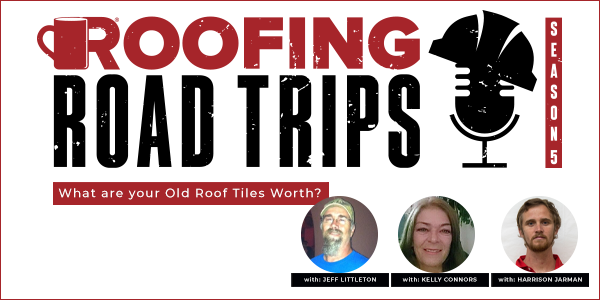
Jeff Littleton, Kelly Connors & Harrison Jarman - What are your Old Roof Tiles Worth? - PODCAST TRANSCRIPTION
Read More ...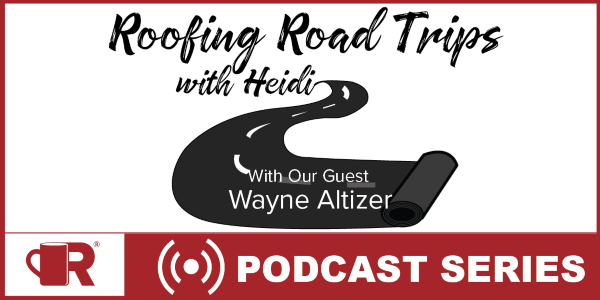
Roofing Road Trip with Heidi- Wayne Altizer PODCAST TRANSCRIPTION
Read More ...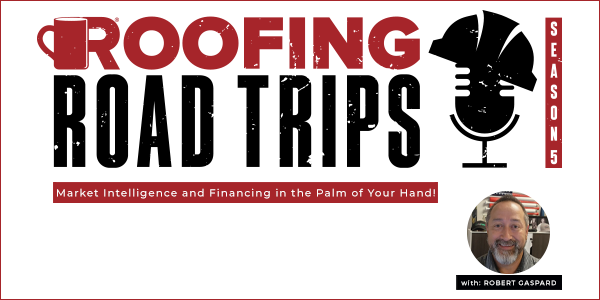
Robert Gaspard - Market Intelligence and Financing in the Palm of Your Hand! - PODCAST TRANSCRIPTION
Read More ...
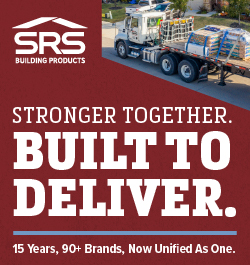

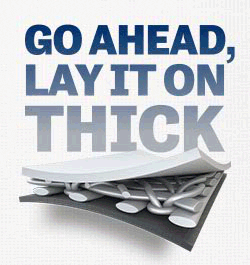

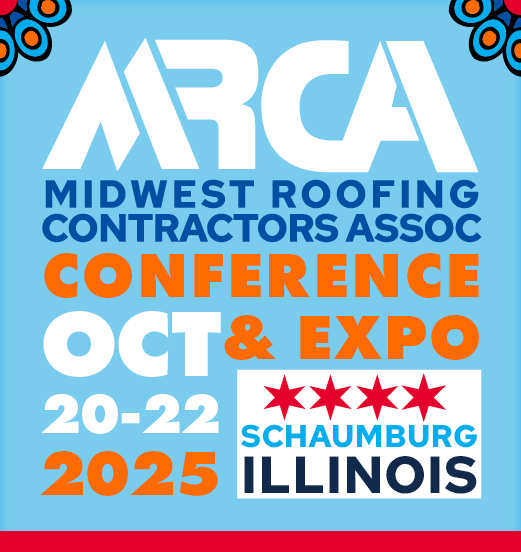



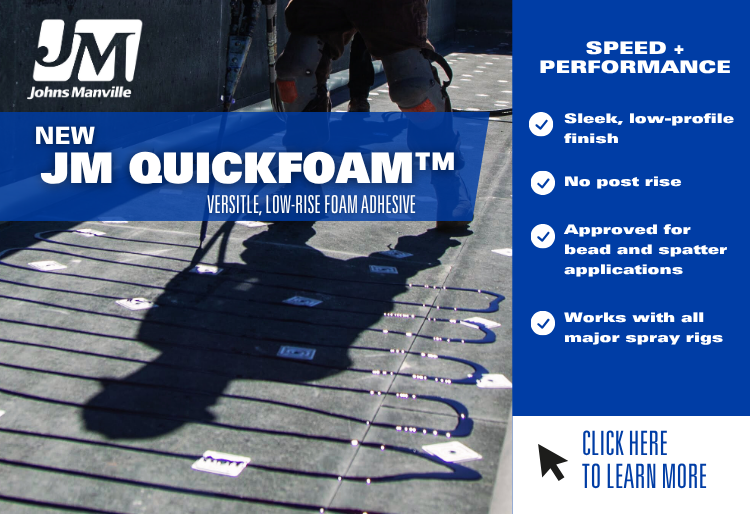





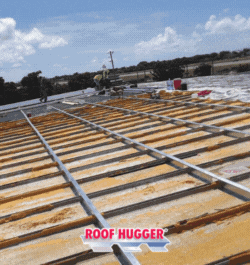


Comments
Leave a Reply
Have an account? Login to leave a comment!
Sign In